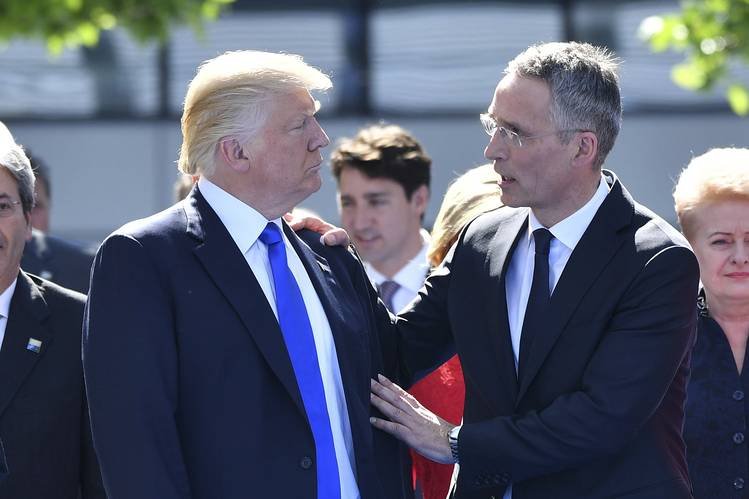Wake-Up Call: Donald Trump’s Recent Actions Benefit Europe
In a recent episode, Donald Trump unintentionally granted Europe a taste of autonomy, albeit through a strategic lens.
Over the weekend, Trump, in a brash manner, released Europe from the confines of the American security bubble. His statement regarding NATO countries not meeting the 2 percent spending target raised eyebrows, as he boldly declared, “I would not protect you, in fact, I would encourage them to do whatever the hell they want. You gotta pay!” This direct and fundamental casting of doubt on America’s commitment to NATO has dealt a significant blow to the alliance, pushing Europe towards self-reliance.
Regardless of Trump’s potential reelection, the fate of Europe’s security hangs in the balance, with the only certainty being the timing of NATO’s collapse.
While the Biden administration contests this narrative, assuring that NATO would remain secure under their leadership, the lingering question remains: for how long?
While much of the discussion around Trump’s comments centers on their apparent contradiction to American interests, Europe now finds itself at a juncture where relying on the whims of approximately 50,000 American swing-state voters every four years seems untenable. The reality is that regardless of the election outcome, the “MAGA” influence will persist in American politics, raising concerns about the potential renewal of an anti-NATO stance by Trump’s Republican successor. Europe cannot afford to dismiss this risk.
Even as a candidate, Trump has demonstrated his sway over the Republican party, compelling it to block a legislative package that included crucial military aid for Ukraine. The uncertain prospect of further aid to Ukraine from the U.S. Congress adds to the growing skepticism.
In essence, the bottom line is that Europe must acknowledge the increasing risk of relying on America for its security, particularly when facing the threat of subjugation to Russia. The stakes are high, and Europe must begin to formulate a Plan B.
However, European leaders seem to be stuck in a phase of anger and denial. NATO Secretary General Jens Stoltenberg expressed concern in a statement, asserting, “Any suggestion that allies will not defend each other undermines all of our security, including that of the U.S., and puts American and European soldiers at increased risk.” The challenge for Europe lies in navigating this complex situation and preparing for a future where self-reliance becomes imperative.
The reality is, Europe finds itself in a predicament largely of its own making. While Trump has persistently criticized NATO’s underperformers, he did not pioneer the discourse. American presidents dating back to Dwight D. Eisenhower have voiced concerns about European allies relying too heavily on American defense.

Unpleasant as it may be for Europeans to acknowledge, Trump does have a valid point—they have been relying on the U.S. for far too long. Expecting the U.S. to indefinitely foot the bill for European security was always an unrealistic proposition.
Post-Trump, with Biden assuming office in 2020, a semblance of normalcy seemed to return. Biden, a lifelong transatlanticist, aimed to repair the damage inflicted by Trump on NATO, allowing Europe to revert to its comfort zone.
Despite some increase in overall defense spending in Europe, especially in the face of Russia’s actions in Ukraine, it remains insufficient. NATO’s own data indicates that only 11 out of 31 members are anticipated to meet the 2 percent spending target by 2023. Germany, Trump’s primary target of criticism, is yet to achieve this benchmark, likely to do so this year due to its contracting economy.
Europe, lulled into a sense of security by Biden’s supportive stance, failed to take decisive action. Rather than gearing up for potential threats by increasing armament production and reinstating conscription, Europe leaned on the protection of the United States. This complacency became evident as Germany, despite increasing support for Ukraine, shifted its national debate away from the war to other topics.
Trump’s recent remarks should serve as a wake-up call for Europe to reassess its strategic direction. While French President Emmanuel Macron talks about European “strategic autonomy,” tangible actions are yet to materialize.
Addressing the nuclear question is a critical step. Europe, collectively possessing about 500 nuclear weapons between France and the U.K., lags behind Russia’s arsenal of nearly 6,000 warheads. However, neither France nor the U.K. has committed to using their nuclear capabilities to protect the entire continent.
The challenges ahead involve not only rebuilding military forces but also reshaping Europe’s collective mindset. As the second anniversary of Russia’s invasion of Ukraine approaches, the war’s implications for European security remain abstract for many.
Even if Europe acknowledges the urgency, the clock is ticking. Replacing the American capability that NATO would lose without U.S. involvement would be a time-consuming and expensive endeavor. Moreover, most European leaders have yet to accept the reality that American protection is already waning.
The scenario of Trump’s potential inauguration in 2025 raises critical questions about NATO’s response to a Russian incursion into Estonia. The harsh reality is that European leaders may need to face the challenge of defending themselves without Washington’s guidance.
The fundamental question remains: Can Europe unite and defend itself without the United States? History, as seen in the disintegration of Yugoslavia in the 1990s, suggests potential chaos without American involvement.
In 1995, during the Bosnia crisis, Biden remarked, “Europe can’t stay united without the United States. There is no moral center in Europe.” Now, Europe has an opportunity to prove him wrong. If successful, they may have only one person to thank.




























Comment Template